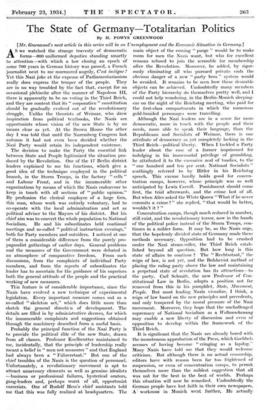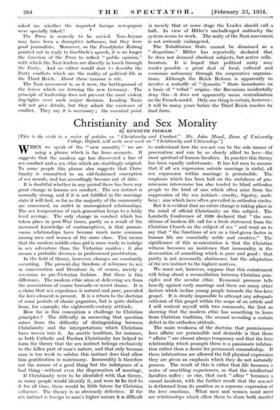The State of Germany—Totalitarian Politics
By H. POWYS GREENWOOD
[Mr. Greenwood's next article in this series will be on Unemployment and the Economic Situation in Germany.] AS we watched the strange travesty of democratic forms-600 uniformed deputies standing smartly to attention—with which a law closing an epoch of some 700 years in German history was passed, a French journalist next to me murmured angrily, C est indigne ! Yet this Nazi joke at the expense of Parliamentarianism really does express the temper of the people. They are in no way troubled by the fact that, except for an occasional plebiscite after the manner of Napoleon III, there is apparently to be no voting in the Third Reich, and they are content that its " corporative " constitution should be gradually evolved out of the revolutionary struggle. Unlike the theorists of Weimar, who drew inspiration from political textbooks, the Nazis are opportunists whose vision of the new State is by no means clear as yet. At the Brown House the other day I was told that until the Nuremberg Congress last autumn it had not even been decided whether the Nazi Party would retain its independent existence.
The decision to make the Party the essential link between State and People legitimized the situation pro- duced by the Revolution. One of the 17 Berlin district leaders explained to me his functions, which give a good idea of the technique employed in the political branch, in the Storm Troops, in the factory " cells " and Labour Front, and in the innumerable other organizations by means of which the Nazis endeavour to keep in touch with all sections of " public opinion." By profession the clerical employee of a large firm, this man, whose work was entirely voluntary, had to co-operate with the local administration and act as -political adviser to the Mayors of his district. But his chief aim was to convert the whole population to National Socialism. He and his subordinates held continual meetings and so-called " political instruction evenings," both for Party members and outsiders. I noticed at one of them a considerable difference from the purely pro- pagandist gatherings of earlier days. General problems and the measures of the Government were debated in an atmosphere of comparative freedom. From such discussions, from the complaints of individual Party members, and from the reports of subordinates the leader has to ascertain for the guidance of his superiors both the general attitude of the people and the practical working of new measures.
This feature is of considerable importance, since the Nazis have evolved a new technique of experimental legislation. Every important measure comes out as a so-called " skeleton act," which does little more than sketch the general directic n of development. The details are filled in by administrative decrees, for which the innumerable complaints and suggestions obtained through the machinery described form a useful basis.
Probably the principal function of the Nazi Party is to provide the political elite of the new State, drawn from all classes. Professor Koellreutter maintained to me, incidentally, that the principle of leadership really meant a belief in " men not measures " and that England had always been a " Ffihrerstaat." But one of the chief troubles of the Nazis is the question of personnel. Unfortunately, a revolutionary movement is apt to attract unsavoury elements as well as genuine idealists —business or professional failures, hysterical orators, gang-leaders and, perhaps worst of all, opportunist careerists. One of Rudolf Hess's chief assistants told me that this was fully realized at headquarters. The main object of the coming " purge " would be to make room for men the Nazis want, but who for excellent reasons refused to join the scramble for membership after the Revolution. Moreover, he added, by rigor- ously eliminating all who pursued private ends the obvious danger of a new " party boss " system would be avoided. It remains to be seen how these desirable objects can be achieved. Undoubtedly many members of the Party hierarchy do themselves pretty well, and I could not help wondering, in the Berlin-Munich sleeping- car on the night of the Reichstag meeting, who paid for the first-class compartments in which the numerous gold-braided personages were travelling.
Although the Nazi leaders are in a sense far more democratic, more in touch with the people and their needs, more able to speak their language, than the Republicans and Socialists of Weimar, there is one attribute of democracy as yet completely lacking in the Third Reich—political liberty. When I tackled a Party .
leader about the case of a farmer imprisoned for indulging in his immemorial privilege of grumbling, he attributed it to the excessive zeal of toadies, to the " one hundred and ten per cent. National Socialists " scathingly referred to by Hitler in his Reichstag speech. This excuse hardly holds good for concen- tration camps, however, whose principle was so well anticipated by Lewis Carroll. Punishment should come first, the trial afterwards, and the crime last of all. But when Alice asked the White Queen " What if he never commits a crime ? " she replied, " that would be better, wouldn't it ? "
Concentration camps, though much reduced in number, still exist, and the revolutionary terror, now in the hands of the political police instead of the Storm Troops, con- tinues in a milder form. It may be, as the Nazis urge, that the hopelessly divided state of Germany made these methods necessary. Opposition had to be crushed under the Nazi steam-roller, the Third Reich estab- lished beyond all question. But how long is this state of affairs to continue ? The " Rechtsstaat," the reign of law, is not yet, and the Bolshevist method of placing the, ruling party above the law and maintaining a perpetual state of revolution has its attractions—to the party. Carl Schmitt, the new Professor of Con- stitutional Law in Berlin, adopts a position not far removed from this in his pamphlet, State, Movement, People. But most leading Nazis visualize, I think, a reign of law based on the new principles and precedents, and only tempered by the moral pressure of the Nazi movement. Moreover, they hope that the unchallenged supremacy of National Socialism as a Weltanschauung may enable a new liberty of discussion and even of opposition to develop within the framework of the Third Reich.
It is significant that the Nazis are already bored with the monotonous approbation of the Press, which Goebbels accuses of having become " cringing as a lapdog." Many Nazis have told me that they would welcome criticism. But although there is no actual censorship, editors have with reason been far too frightened of suspension, or even of concentration camps, to permit themselves more than the mildest suggestion that all was not for the best in the best of worlds. Perhaps this situation will now be remedied. Undoubtedly the German people have lost faith in- their own newspapers. A' workmakt in Munich went further, He actually asked me whether the imported foreign newspapers • were specially faked !
The • Press is scarcely to be envied. Non-Aryans may have been a disruptive influence, but they were good journalists. Moreover, as the Franhfurter Zeitung pointed out in reply to Goebbels's speech, it is no longer the function of the Press to reflect " public opinion," with which the Nazi leaders are directly in touch through the Party. And no editor would dare ti describe the Party conflicts which are the reality of political life in the Third Reich. About these rumour is rife. • The Nazi movement is, as it were, the battleground of the forces which are forming the new Germany. The principle of leadership does not prevent the most violent dog-fights over each major decision. Leading . Nazis will not give details, but they admit the existence of conflict. They say it is necessary ; the essential point is merely that at. some stage the Leader should call a halt, In view of Hitler's unchallenged authority the system seems to work. The unity of the Nazi movement is not seriously endangered.
The Totalitarian. State cannot be dismissed as a "despotism." Hitler has repeatedly declared that he does not demand obedient subjects, but active colla- borators. It is hoped that political unity may render possible a great deal of local, cultural and economic autonomy through the corporative organiza- tions. Although the Reich Reform is apparently to involve a reshuffle of , " dynastic " State boundaries on a basis of " tribal " origins—the Bavarians incidentally deny this—it does not apparently mean centralization on the French model. Only one thing is certain, however : it will be many years before the Third Reich reaches its final form.

















































 Previous page
Previous page